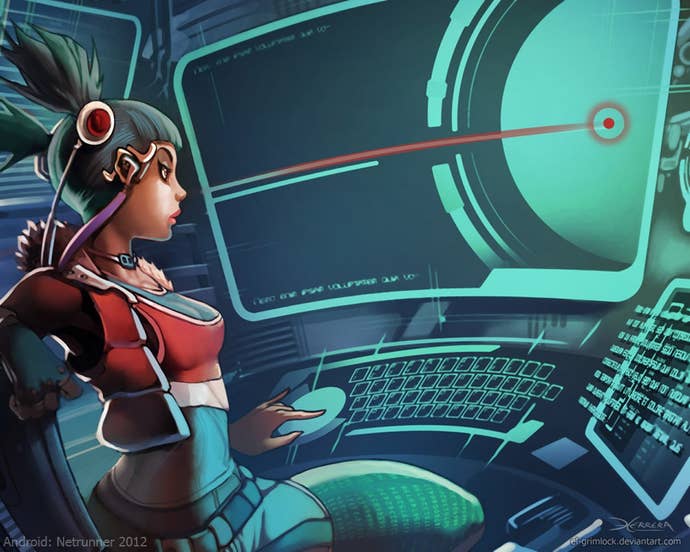BOARDgamer: Jacking In to Netrunner's Cyberpunk World
Android: Netrunner is one of the hottest tabletop games around right now. But how friendly is it to a beginner? Pete jacks in and tries to avoid the attention of the Jinteki corporation and Project Junebug.
This article first appeared on USgamer, a partner publication of VG247. Some content, such as this article, has been migrated to VG247 for posterity after USgamer's closure - but it has not been edited or further vetted by the VG247 team.
Don't get me wrong, I love moving little pieces of wood and cardboard around on a beautifully illustrated game board as much as the next tabletop enthusiast -- but for me, there's something I always find inherently satisfying about card-centric games.
I think it might be the randomness factor -- the knowledge that, even with the most lovingly constructed deck in the world, there's still the possibility for a lesser player to beat a stronger one depending on the relative strength of their draws. I like that; it keeps things interesting -- and, as someone who habitually loses heavyweight strategy games that are less dependent on luck, I tend to have a lot more fun in the knowledge that I have at least a chance of success in a game. It's not all about winning or losing, of course -- but consistent poor performance in a game without really understanding why you're failing at what you do is not a particularly good way to entice me back to the table for another go.
Enter Android: Netrunner, then, a game that has its roots in the original Netrunner card game designed by Richard "Magic: The Gathering" Garfield back in 1996. Unlike Netrunner's original incarnation, however, Android: Netrunner is a "living card game" rather than a "customizable card game" -- in other words, while 1996's Netrunner was like Magic in that you could buy booster packs with random collections of cards to build your deck, the newer Android: Netrunner comes in a starter pack that always includes the same cards, and is expanded through static "data packs" that likewise always include the same cards. In other words, buy a box of Android: Netrunner, and you have everything you need for two players to play and build several different decks.

Android: Netrunner (hereafter "Netrunner" for the sake of brevity) is noteworthy in the field of two-player card games in that it's asymmetrical. Unlike games such as Magic (or, indeed, the recent My Little Pony CCG) where two players follow the same basic rules despite making use of differently themed decks of cards, the two competing players in a game of Netrunner have totally different mechanics. One player takes on the role of one of the omniscient, omnipotent Corporations from the Android setting's dystopian future; the other takes on the role of a Runner -- a hacker attempting to steal the Corporation's valuable data.
The basic victory condition for both sides is the same -- score seven points from the Corporation's "agenda" cards -- but there's also an additional victory condition for each side: the Runner can win by depleting the Corporation's draw deck, and the Corporation can win by "flatlining" the runner by forcing them to discard more cards than they have in their hand. Certain decks on both sides are very obviously set up to close a game through one of these conditions rather than scoring points, so it pays to be aware of your opponent before you start playing -- fortunately, rather than both decks being completely blind to the other side, each player has an always-visible "identity card" indicating their deck's primary color. It takes a while to learn what these different colors mean -- Runners, watch out for Jinteki (red) Corporation decks in particular, especially as the game's instructions recommend this as a good "starter" deck -- but once you do, you can both determine the best way to achieve victory without being horribly defeated.

The interesting thing about Netrunner is that it isn't directly confrontational for the most part. Very little the Corporation does can have a direct and immediate impact on the Runner; likewise, when the Runner makes a Run attempt, they're not doing so in an attempt to "damage" the corporation -- they're doing it to either gain some information about the Corporation's defenses, or simply to inconvenience them somehow. Instead, the game becomes about setting traps and bluffing, particularly for the Corporation player, who hides a lot more information than the Runner does -- could that seemingly unprotected server card have something valuable in it, or is it all a ruse to lure a gullible Runner in? Or is it a double-bluff, attempting to make the Runner think the valuable card is behind several layers of security software, when actually it's just sitting out there in the open, because the Corp couldn't possibly be that stupid as to leave an Agenda undefended?
Netrunner's brilliance is partly a result of its theme. As anyone who has played a really good hacking-themed video game will attest -- Introversion's Uplink is my personal favorite -- there's something inherently terrifying about breaking into a system you're not supposed to be poking around in, particularly if you know that you only have a matter of seconds to get what you're after, get out and clear your tracks. Netrunner also makes this frightening from the perspective of the player being broken into -- the Corporation. It's easy to feel confident when you have a tasty card protected behind three or more layers of "ice" security software, but as soon as the Runner starts playing special ability cards and brute-forcing their way ever-closer to your precious Agenda with alarming rapidity, that confidence quickly dissipates -- particularly if just one more Agenda card would win them the game.
Then, too late, the Runner remembers you're playing Jinteki; you flip over a Project Junebug card with three advancement tokens on it and splatter their brain all over their monitor without remorse. You win, and corporate life continues to rule the world. Good job.

Netrunner may initially seem like a daunting prospect, particularly for those who have never played a two-player competitive card game of this type. And for sure, games can get seriously intense between high-level players -- but even for beginners, there's a lot to like here. Once you get your head around the basic mechanics -- not to mention the game's laudably atmospheric but initially confusing insistence on using authentically cyberpunk-esque terminology for mundane game elements such as your draw pile (it's the Corporation's "R&D department" and the Runner's "Stack") -- you'll find that games flow quickly and simply, and can be resolved in no more than 20-30 minutes. This makes it a great "weeknight" game, plus the fact that everything you need to play with two people comes in the starter set makes it very portable and easy to introduce newcomers to without forcing them to cough up for cards of their own.
In short, its good reputation and current popularity is highly deserved; if you have the opportunity to give the game a go for yourself, take it, and if you have a friendly local game shop in your near vicinity, go grab yourself a copy of your own.
